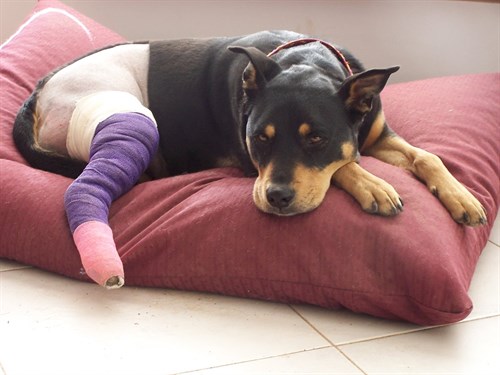Canine Car Collisions
In seconds your life can be changed forever. As distractions increase for drivers, so does the number of car accidents. Unfortunately, pets are often affected by distracted drivers and can incur serious injury if they are hit by a car.

“On average, here at the Texas A&M Small Animal ER, we tend to see at least three to five animals that have been hit by a car each week,” said Dr. Brooke Smith, veterinary resident instructor at the Texas A&M College of Veterinary Medicine & Biomedical Sciences.
“Most of the victims are medium to large dog breeds that were playing somewhere off leash and ran into the road or dogs that escaped from the back yard,” Smith added. “We do see smaller dogs and cats, but unfortunately due to their size and the amount of trauma a vehicle can cause, they sometimes pass away before they make it to the hospital.”
If you do see an animal hit by a car, please call your local Animal Control Officer on duty immediately.
“Animals that have sustained serious trauma will be in a lot of pain,” Smith says, “and there is a high risk that a good Samaritan will be bitten while trying to help the hurt animal. Animal Control Officers are trained to handle these situations.”
If you witness an animal getting hit by a car, ask someone to assist you to place the animal in your car and bring it to the nearest emergency care facility. However, if your pet is in a lot of pain there is a possibility that it may bite you. Smith recommends placing a blanket or towel over its head to ensure your safety when helping your pet. It is always good to know where the nearest 24-hour veterinary care facility is in case of emergency situations like this.
One important point to take away from this topic is to have your pet microchipped and to keep your contact information current with the company that supplied the microchip.
“It is a misconception that pet owners think once their pet is microchipped, that we can track the chip itself,” said Smith. “We simply scan the chip with a special reader and it gives us a number of the chip. We then call the company, pass along the number, and they contact you directly. If you, as the pet owner, have not contacted the company to give them your current information, we will not be able to find you. If we cannot get your permission to treat your pet, it may not receive the care it needs to survive.”
Smith also advises pet owners to provide their pets with collars that clearly state a current phone number to call in an emergency. She mentions that a rabies tag is not always useful as most emergency cases occur after hours when veterinary clinics are closed.
Owners can take precautionary measures to avoid serious car accident injuries.
“Other recommendations are to never place your pet in the back of a moving vehicle, unless it is placed in a pet-safe kennel,” said Smith. “Even the best trained dogs can jump or fall out of truck beds and can sustain serious and/or life-threatening trauma.”
“The most common injuries involving vehicular accidents are bone fractures, skin lacerations and abrasions, and life-threatening internal bleeding,” Smith added. “Treating these kinds of conditions is very expensive, and many times pets have to be euthanized because their owners cannot afford the care required to save their lives. The best treatment is prevention – placing your dog in a pet-safe kennel in the truck bed can save his/her life.”
Owners should also keep their dog on a leash when in public. It is also important to keep an eye on the dog while it is outside or to secure a barrier for the dog to avoid sporadic running toward a nearby road. Prevention is always the best treatment plan to ensure your canine companion is happy and healthy.
Pet Talk is a service of the College of Veterinary Medicine & Biomedical Sciences, Texas A&M University. Stories can be viewed on the Web at vetmed.tamu.edu/news/pet-talk. Suggestions for future topics may be directed to editor@cvm.tamu.edu.


